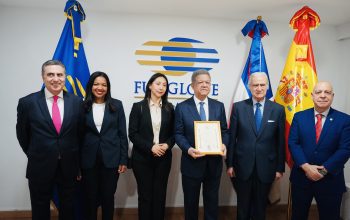news
GFDD President Fernández Moderates High Level UN Panel Examining the Implementation of ‘North-South, South-South, Triangular Cooperation’, and ICTs in the Post 2015-Development Agenda
May 22, 2014
On May 22, 2014, the former Head of State and President of Global Foundation for Democracy and Development and Fundación Global Democracia y Desarrollo (FUNGLODE), Leonel Fernández moderated a High Level panel discussion at United Nations Headquarters in New York entitled, "How can all forms of cooperation, namely North-South, South-South and Triangular Cooperation, as well as ICT for development, be utilized to achieve effective means of implementation for the
post-2015 development agenda?”.
The panel discussion chaired by President Fernández took place on the second day of a High Level Event focused on the “Contributions of North-South, South-South, Triangular Cooperation, and ICT for Development to the Implementation of the Post-2015 Development Agenda”.
The High Level event began on Wednesday, May 21 with opening remarks offered by H.E. John W. Ashe, President of the General Assembly and Mr. Jan Eliasson, Deputy Secretary General of the UN. General remarks were also given by Ms. Silvia Ribeiro, Latin America Director for ETC group, as
well as a key note address by Ms. Helen Clark, Administrator of the United Nations Development Programme. Ms. Ribeiro commented on the fact that there are unequal power relations among multilateral organizations. With this in mind, she stressed the need for creative partnerships, but warned that the involvement of the private sector in these ventures should be done cautiously so as not to socialize the costs and privatize the profits of development initiatives. Calling for innovative
sources of funding for sustainable development, she underscored the need for these new funding mechanisms to be supported by a binding regulatory and accountability mechanism. Finally, Ms. Ribeiro concluded by highlighting the role of role of Information Communication Technology (ICT) in contributing to a socially and ecologically fair and sustainable development agenda. Ms. Clark supported the statement of Ms. Ribeiro highlighting the initiatives of UNDEP and stressing that the
“exchange of knowledge, ideas and technology is at the heart of development in the 21st century” and that we “will need broad partnership to ensure a successful post-2015 development agenda”.
The High Level event resumed on Thursday, May 22 with a very engaged morning panel discussion entitled “How can all forms of cooperation, namely North-South, South-South and Triangular Cooperation, be strengthened to promote economic
growth, employment and decent work for all?” and chaired by H.E. Ms. Jane Stewart, Special Representative and Director of the ILO Office to the United Nations. Highlighting an overall agreement that the Sustainable Development Goals (SDGs) need to tackle the unfinished work of the Millennium Development Goals (MDGs), the discussion called for new forms of cooperation. It featured presentations by notable speakers including: Mr. Akihiko Tanaka, President of the Japan International
Cooperation Agency (JICA), Ms. Alicia Barcena, Executive Secretary of the Economic Commission for Latin America and the Caribbean (ECLAC) and several other discussants. Mr. Tanaka stressed that North-South Cooperation is not just a simple transfer of information from North to the South. He explained that through mutual collaboration, developed countries are also learning to improve their own societies. He concluded his statement by stressing that there is an overall requirement for
transparency in order to transfer this knowledge and information. Ms. Barcena emphasized Mr. Tanaka’s statement by highlighting that equality should be the main driver of the international community’s effort to enhance cooperation in the Post-2015 development agenda.
The second panel level discussion, which took place in the afternoon, was chaired by President Fernández. The session was also very dynamic, focusing on the role of ICTs, the digital
revolution and the issue of international copyright. The panel discussion featured presentations by reputable speakers, including: Dr. Hamadoun Touré, Secretary General of the International Telecommunication Union (ITU), H.E. Ms. Suvi Lindén, former Minister of Communications of Finland and Member of the Broadband Commission for Digital Development and Mr. David Steven, Senior Fellow and Associate Director at the Center on International Cooperation of the New York University (CIC NYU). Dr.
Touré underscored the importance of ICTs as drivers of the three pillars of sustainable development: economic and social progress and environmental balance.
Despite having achieved the goal of getting 3 billion people online by the end of 2014, Dr. Touré warned that this figure was still not high enough as 2/3 of people on this planet remain offline. H.E. Ms. Suvi Lindén concentrated her comments on the fact that the internet should be made affordable to everyone. In
effecting this digital transition Ms. Lindén observed that this could be achieved through public private partnerships but these would require new supporting policy and legal frameworks. Mr. Steven made the final presentation by stressing that new effective forms of cooperation would require transparency and accountability frameworks.
He highlighted that digital knowledge is key to the future of ICTs and that the copyright framework should be rethought to enable its
transition into the Post 2015 agenda. Further discussants also took to the floor to comment on the role of ICT as being an essential feature of life providing public services, empowering women and eradicating poverty.
President Fernández concluded the discussion by thanking the participants, the country delegates and civil society representatives for their contributions and reminded that the audience that quality of education on ICT needs to be improved, including teacher
training programs and new curricula, to allow ICTs to play a larger role in the SDGs era and make a shift into the information society.
Concluding the two day discussion on the role of cooperation and ICTs development, the President of the General Assembly, John W. Ashe, reminded participants of the importance of their exchanges on this issue, stressing that he would prepare a report highlighting all the submissions made during this event and present it to the UN
Secretary General, Mr. Ban Ki-moon.
Related links:
http://www.un.org/en/ga/







